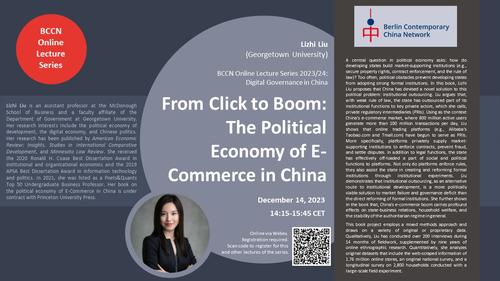BCCN Online Lecture Series #3: From Click to Boom: The Political Economy of E-Commerce in China
Lizhi Liu (Georgetown University)
This lecture series is hosted by the Berlin Contemporary China Network (BCCN), an initiative by researchers at Humboldt-Universität zu Berlin, Freie Universität Berlin, Max Planck Institute for the History of Science, Max Planck Institute for Social Anthropology, and Technische Universität Berlin. It is organized by Freie Universität Berlin. Here you can find an overview of the lecture series.
Please register here: https://fu-berlin.webex.com/webappng/sites/fu-berlin/webinar/webinarSeries/register/8df470e12e264f959533abfdd58bd646
Abstract:
A central question in political economy asks: how do developing states build market-supporting institutions (e.g., secure property rights, contract enforcement, and the rule of law)? Too often, political obstacles prevent developing states from adopting strong formal institutions. In this book, Lizhi Liu proposes that China has devised a novel solution to this political problem: institutional outsourcing. Liu argues that, with weak rule of law, the state has outsourced part of its institutional functions to key private actors, which she calls, private regulatory intermediaries (PRIs). Using as the context China’s e-commerce market, where 800 million active users generate more than 100 million transactions per day, Liu shows that online trading platforms (e.g., Alibaba’s Taobao.com and Tmall.com) have begun to serve as PRIs. More specifically, platforms privately supply market-supporting institutions to enforce contracts, prevent fraud, and settle disputes. In addition to legal functions, the state has effectively off-loaded a part of social and political functions to platforms. Not only do platforms enforce rules, they also assist the state in creating and reforming formal institutions through institutional experiments. Liu demonstrates that institutional outsourcing, as an alternative route to institutional development, is a more politically viable solution to market failure and governance deficit than the direct reforming of formal institutions. She further shows in the book that, China's e-commerce boom carries profound effects on state-business relations, household welfare, and the stability of the authoritarian regime in general.
This book project employs a mixed methods approach and draws on a variety of original or proprietary data. Qualitatively, Liu has conducted over 200 interviews during 14 months of fieldwork, supplemented by nine years of online ethnographic research. Quantitatively, she analyzes original datasets that include the web-scraped information of 1.76 million online stores, an original national survey, and a longitudinal survey on 2,800 households conducted with a large-scale field experiment.
Bio:
Lizhi Liu is an assistant professor at the McDonough School of Business and a faculty affiliate of the Department of Government at Georgetown University. Her research interests include the political economy of development, the digital economy, and Chinese politics. Her research has been published by American Economic Review: Insights, Studies in International Comparative Development, Minnesota Law Review. She received the 2020 Ronald H. Coase Best Dissertation Award in institutional and organizational economics and the 2019 APSA Best Dissertation Award in information technology and politics. In 2021, she was listed as a Poets&Quants Top 50 Undergraduate Business Professor. Her book on the political economy of E-commerce in China is under contract with Princeton University Press.



